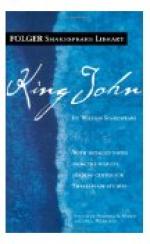|
This section contains 4,695 words (approx. 16 pages at 300 words per page) |

|
SOURCE: Levin, Carole. “‘I Trust I May Not Trust Thee’: Women's Visions of the World in Shakespeare's King John.” In Ambiguous Realities: Women in the Middle Ages and Renaissance, edited by Carole Levin and Jeanie Watson, pp. 219-34. Detroit: Wayne State University Press, 1987.
In the following essay, Levin observes the strength, honesty, and insight of the female characters in the otherwise corrupted world of King John.
“I trust I may not trust thee,” Constance says to the messenger who informs her of the truce between Philip of France and John of England that ignores her son Arthur's claim.1 Constance's awareness that she cannot trust the world in which she lives, a world that is a “moral swamp and has the ‘smell of sin’” in the words of Herschel Baker (767), is one of the underlying themes of Shakespeare's play, King John. Critics have often applauded the character Faulconbridge, bastard...
|
This section contains 4,695 words (approx. 16 pages at 300 words per page) |

|


